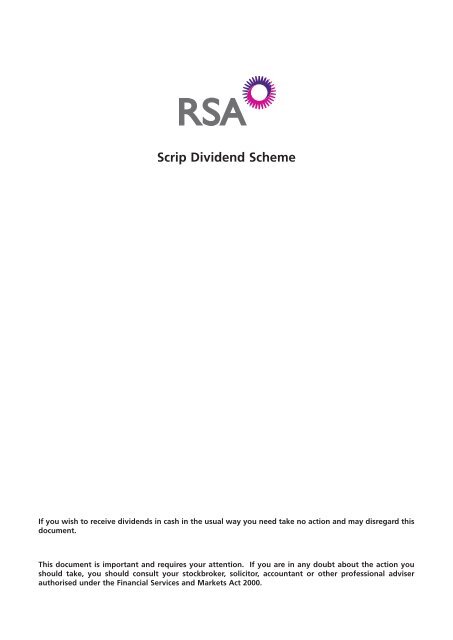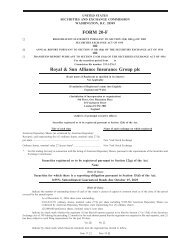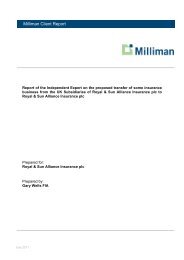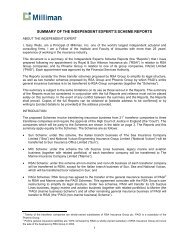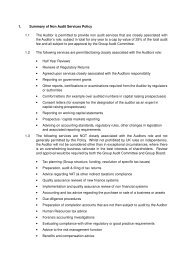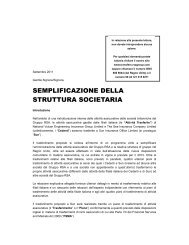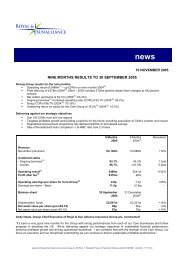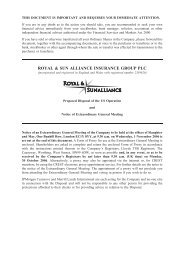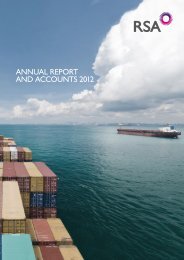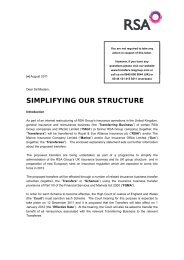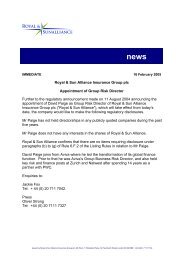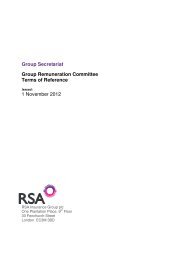Scrip Dividend Scheme
Scrip Dividend Scheme
Scrip Dividend Scheme
You also want an ePaper? Increase the reach of your titles
YUMPU automatically turns print PDFs into web optimized ePapers that Google loves.
<strong>Scrip</strong> <strong>Dividend</strong> <strong>Scheme</strong><br />
If you wish to receive dividends in cash in the usual way you need take no action and may disregard this<br />
document.<br />
This document is important and requires your attention. If you are in any doubt about the action you<br />
should take, you should consult your stockbroker, solicitor, accountant or other professional adviser<br />
authorised under the Financial Services and Markets Act 2000.
1. WHAT IS THE SCRIP DIVIDEND SCHEME?<br />
The Company is offering you a <strong>Scrip</strong> <strong>Dividend</strong> <strong>Scheme</strong> which enables you to receive new<br />
Ordinary Shares of 27.5p each instead of cash dividends. The <strong>Scheme</strong> will apply to both<br />
interim and final dividends and enables you to increase your holding in the Company<br />
without incurring dealing costs or stamp duty. At the same time, the Company retains<br />
cash for reinvestment in the business which would otherwise be paid as a dividend.<br />
2. WHO CAN JOIN THE SCHEME?<br />
All UK Shareholders can join the <strong>Scheme</strong>. For details regarding overseas Shareholders,<br />
please see the answer to question 10.<br />
3. HOW DO I JOIN THE SCHEME?<br />
Please complete the enclosed Mandate Form and return it to Equiniti Limited, Share<br />
<strong>Dividend</strong> Operations, Aspect House, Spencer Road, Lancing, West Sussex BN99 6DA. No<br />
acknowledgement will be issued.<br />
Your Mandate will remain in force for all future dividends until cancelled by you in<br />
writing. For further details see the answer to question 15.<br />
Mandate Forms must be received by Equiniti Limited at least 20 working days before the<br />
dividend payment date to be eligible for that dividend. For details of this date for each<br />
interim and final dividend please refer to the Company’s website or call the Equiniti<br />
Limited share dividend helpline on 0871 384 2268, (calls to this number are charged at 8p<br />
per minute from a BT landline, other telephony provider costs may vary), or +44 121 415<br />
7173 if you are calling from a mobile phone or from overseas. Shareholders with a text<br />
phone facility should use 0871 384 2255. Mandate Forms received after that date will be<br />
applied in time for the next dividend.<br />
4. HOW MANY NEW SHARES WILL I RECEIVE?<br />
The number of New Shares you will receive for each dividend will depend on:<br />
(a)<br />
(b)<br />
(c)<br />
the amount of the cash dividend;<br />
the number of Ordinary Shares registered in your name; and<br />
the price to be used in calculating your New Share entitlement. This will be the<br />
average of the middle market quotations of an Ordinary Share, derived from the<br />
London Stock Exchange Daily Official List, for the five business days starting on<br />
the day the Ordinary Shares are first quoted ex-dividend.<br />
Fractions of New Shares will not be issued and any cash balance will be carried forward,<br />
without interest, and included in the calculation for the next dividend payment.<br />
1
For example only:<br />
• The cash dividend is 2p per Ordinary Share.<br />
• You hold 1,000 Ordinary Shares and take New Shares instead of the cash dividend.<br />
• The calculation price is £1.05<br />
Value of your cash dividend 1,000 x 2p = £20.00<br />
Number of New Shares £20.00 ÷ £1.05 = 19.05<br />
Rounded down to 19 New Shares.<br />
Value of New Shares 19 x £1.05 = £19.95<br />
In this case a cash balance of 5 pence would be carried forward to the next dividend<br />
payment. (See question 6.)<br />
5. HOW WILL I KNOW HOW MANY NEW SHARES I HAVE RECEIVED?<br />
You will receive a statement with your share certificate showing the number of New<br />
Shares you have received instead of the cash dividend and any cash balance carried<br />
forward to the next dividend payment. The statement will also contain details of the<br />
calculation price and the notional tax credit, which you will need for your tax return. If<br />
you wish to know the calculation price before this, please contact Equiniti Limited three<br />
business days after the record date of the particular dividend. (See question 17.)<br />
If on any occasion your cash dividend entitlement, together with any cash balance<br />
brought forward, is insufficient to acquire at least one New Share, you will receive a<br />
statement explaining that no New Shares have been issued to you and showing how<br />
much cash has been carried forward to the next dividend.<br />
6. WHAT WILL YOU DO WITH THE CASH BALANCE?<br />
When working out your New Share entitlement, it is unlikely that the calculation will<br />
give rise to an exact number of New Shares. As fractions of New Shares cannot be issued,<br />
an entitlement to their cash value (being the cash balance) will be carried forward,<br />
without interest, and included in the calculation for your next dividend.<br />
If you withdraw from the <strong>Scheme</strong> or if you sell or transfer your entire holding of Ordinary<br />
Shares, or if the Company terminates the <strong>Scheme</strong> or if (being the sole Shareholder) you<br />
die, are declared bankrupt, go into liquidation or suffer from mental incapacity, any cash<br />
balance held will be paid to you or your estate or trustee entitled as soon as reasonably<br />
practicable.<br />
2
7. WHEN WILL I RECEIVE MY SHARE CERTIFICATE?<br />
Subject to the New Shares being admitted to the official list of the UK Listing Authority<br />
and to trading on the London Stock Exchange’s market for listed securities, share<br />
certificates will be posted, at your risk, on or about the same day as dividend warrants<br />
are posted to Shareholders who are taking the dividend in cash. CREST members will<br />
have their CREST accounts credited directly with New Shares on the same day the cash<br />
dividend is paid. In the unlikely event that the New Shares are not admitted to listing,<br />
the dividend for Shareholders who have chosen to receive New Shares will be paid in cash<br />
as soon as reasonably practicable.<br />
When issued, the New Shares will rank equally in all respects with the existing Ordinary<br />
Shares and will qualify for all future dividends.<br />
8. DOES THE SCHEME APPLY TO ORDINARY SHARES HELD IN JOINT NAMES?<br />
Yes, but all joint Shareholders must sign the Mandate Form.<br />
9. CAN I COMPLETE A MANDATE FORM FOR PART OF MY HOLDING?<br />
No. Mandate Forms will not be accepted for part of a shareholding. The Mandate Form<br />
applies to the full number of Ordinary Shares registered in your name at any time.<br />
Notwithstanding this, the Company may at its discretion permit a Shareholder to<br />
complete a Mandate Form in respect of a lesser number of Ordinary Shares than the full<br />
shareholding where that Shareholder is acting on behalf of more than one beneficial<br />
owner i.e. a nominee Shareholder. Any such completion in respect of part of a<br />
shareholding will continue to apply for future dividends to the number of Ordinary<br />
Shares specified until it is altered or cancelled. A cash dividend will automatically be paid<br />
on any Ordinary Shares which are not specified in a Mandate Form.<br />
10. CAN OVERSEAS SHAREHOLDERS JOIN THE SCHEME?<br />
Yes. However, it is the responsibility of any person outside the United Kingdom wishing<br />
to receive New Shares to ensure that an election to receive such New Shares can validly<br />
be made without any further obligation on the part of the Company, and to satisfy<br />
himself or herself as to the full observance of the laws of the relevant territory, including<br />
complying with any regulatory or legal procedures which may be required and observing<br />
all other necessary formalities.<br />
11. WHAT HAPPENS IF I BUY MORE SHARES AFTER I HAVE COMPLETED A MANDATE FORM?<br />
Any additional Ordinary Shares which you buy, and which are registered in your name<br />
prior to the record date for any dividend, will be covered by the Mandate Form you have<br />
completed and you will receive New Shares instead of cash dividends for your entire<br />
holding.<br />
12. WHAT HAPPENS IF I SELL PART OF MY HOLDING?<br />
The <strong>Scheme</strong> will apply to your remaining Ordinary Shares.<br />
3
13. WHAT HAPPENS IF I HAVE MORE THAN ONE HOLDING?<br />
If your Ordinary Shares are registered in more than one holding and you want to receive<br />
New Shares instead of cash dividends, you must complete a separate Mandate Form for<br />
each holding. If you wish, you may ask Equiniti Limited to combine your holdings. You<br />
cannot however combine a sole shareholding with a joint shareholding.<br />
14. WHAT ARE THE TAX EFFECTS?<br />
The tax effect of taking New Shares will depend on each Shareholder’s individual<br />
circumstances. Explanatory notes are given on pages 6 and 7.<br />
It must be stressed that if you are not sure how you will be affected, it is recommended<br />
that you consult your professional adviser before taking any action.<br />
15. CAN I CANCEL MY INSTRUCTIONS?<br />
You may cancel your instructions at any time by writing to Equiniti Limited, Share<br />
<strong>Dividend</strong> Operations, Aspect House, Spencer Road, Lancing, West Sussex BN99 6DA. For<br />
a cancellation to be effective for a particular dividend, it must be received at least 20<br />
working days before the payment date for that dividend. If a cancellation is received<br />
after that date, it will apply to all subsequent dividends.<br />
Instructions will be regarded as cancelled for any Ordinary Shares which a Shareholder<br />
sells or otherwise transfers to another person. This will take effect from registration of<br />
the share transfer.<br />
Instructions will be cancelled immediately on notice of death, bankruptcy or mental<br />
incapacity of a Shareholder.<br />
16. CAN THE COMPANY CANCEL THE SCHEME?<br />
The <strong>Scrip</strong> <strong>Dividend</strong> <strong>Scheme</strong> may be amended, suspended or terminated at any time at the<br />
discretion of the Directors by notice in writing to Shareholders. In the case of an<br />
amendment, your instructions will remain valid under the amended terms unless you<br />
notify Equiniti Limited in writing to the contrary.<br />
To protect Shareholders participating in the <strong>Scheme</strong>, Mandate Forms may be cancelled or<br />
suspended respectively by the Directors at their sole discretion if 20 working days prior<br />
to the dividend payment date the price of an Ordinary Share has fallen 15 per cent. or<br />
more below the calculation price used to determine Shareholders’ entitlements. In the<br />
event, and if the Directors cancel or suspend Mandates, Shareholders will receive their<br />
dividend in cash as soon as possible.<br />
17. WHAT DO I DO IF I HAVE ANY QUESTIONS?<br />
Please write to Equiniti Limited, Share <strong>Dividend</strong> Operations, Aspect House, Spencer Road,<br />
Lancing, West Sussex BN99 6DA.<br />
If you wish to know the calculation price or you have any other enquiries concerning<br />
the <strong>Scheme</strong> please call Equiniti Limited, tel 0871 384 2268, (calls to this number are<br />
charged at 8p per minute from a BT landline, other telephony provider costs may vary),<br />
or +44 121 415 7173 if you are calling from a mobile phone or from overseas.<br />
Shareholders with a text phone facility should use 0871 384 2255.<br />
If you wish to receive dividends in cash in the usual way you need take no action and may<br />
disregard this document.<br />
4
DEFINITIONS<br />
“CREST”<br />
“Directors”<br />
“London Stock Exchange”<br />
“Mandate”<br />
“Mandate Form”<br />
“New Shares”<br />
“Ordinary Shares”<br />
the “Company”<br />
“<strong>Scrip</strong> <strong>Dividend</strong> <strong>Scheme</strong>” or<br />
“<strong>Scheme</strong>”<br />
“Shareholder”<br />
the relevant system (as defined in the Uncertificated<br />
Securities Regulations 2001 (SI/3755)) in respect of which<br />
CRESTCo Limited is the operator<br />
the directors of RSA Insurance Group plc<br />
the London Stock Exchange plc<br />
the instructions of a Shareholder as set out in a valid<br />
Mandate Form<br />
a mandate in a form provided by the Company from a<br />
Shareholder to the Directors to allot under the terms of the<br />
<strong>Scheme</strong> New Shares in lieu of cash dividends to which they<br />
may become entitled from time to time<br />
new Ordinary Shares issued under the <strong>Scheme</strong><br />
ordinary shares of 27.5p each in the capital of the Company<br />
RSA Insurance Group plc<br />
the RSA Insurance Group plc <strong>Scrip</strong> <strong>Dividend</strong> <strong>Scheme</strong><br />
comprised in the terms and conditions contained in this<br />
document as amended from time to time<br />
a holder of Ordinary Shares<br />
5
TAXATION<br />
The Company has been advised that, under current United Kingdom legislation, the taxation<br />
consequences for Shareholders electing to receive New Shares instead of a cash dividend will,<br />
broadly, be as follows. This summary only relates to the position of Shareholders resident in the<br />
United Kingdom for taxation purposes who hold their shares as an investment. The precise<br />
taxation consequences for a particular Shareholder will depend on that Shareholder’s individual<br />
circumstances.<br />
This summary of the taxation treatment is not exhaustive. If you are in any doubt as to your<br />
tax position, you should consult your professional adviser before taking any action.<br />
Individuals<br />
Where individuals elect to receive New Shares in place of a cash dividend, they will be treated as<br />
having received gross income of an amount which, when reduced by income tax at the rate of<br />
10 per cent. is equal to the “cash equivalent of the New Shares”. The cash equivalent of the New<br />
Shares will be the amount of the cash dividend foregone unless the market value of the New<br />
Shares on the first day of dealings on the London Stock Exchange (the “opening value”) differs<br />
substantially (i.e. by 15 per cent. or more either way according to current HM Revenue & Customs<br />
practice) from the cash dividend foregone in which case the opening value will be treated as the<br />
cash equivalent of the New Shares for taxation purposes.<br />
Individuals who (after having taken into account their receipt of New Shares) pay income tax at<br />
the starting rate of 10 per cent. or the basic rate of 20 per cent. only will have no further liability<br />
to income tax in respect of the New Shares received. Individuals who are otherwise subject to<br />
income tax at the higher rate of 40 per cent. will be liable to pay tax at the reduced rate of 32.5<br />
per cent. on the gross income which they are treated as having received. For example, if the cash<br />
equivalent of the New Shares received is £80, the individual will be treated as having received<br />
gross income of £88.88 and as having paid income tax of £8.88 on that gross amount. The higher<br />
rate tax payer will be liable to pay additional tax of £20 (the difference between £28.88 and the<br />
£8.88 treated as having been paid). Subject to what is said above in relation to the<br />
determination of the cash equivalent of the New Shares, this is the same treatment as for cash<br />
dividends.<br />
For capital gains tax purposes, if an election to receive New Shares instead of a cash dividend is<br />
made, then the “cash equivalent of the New Shares” (as described above) will be treated as being<br />
the base cost for the New Shares. The New Shares will be treated as having been acquired as a<br />
separate acquisition from the existing shares and capital gains tax at a flat rate of 18% will apply<br />
to any gains arising on disposal (subject to any annual exemptions available).<br />
6
Trustees<br />
This section assumes, as is likely to be the case, that New Shares received by trustees if they elect<br />
to receive the dividends under the <strong>Scheme</strong> will be income in the hands of the trustees for trust<br />
law purposes. Trustees who are liable to income tax at the rate applicable to trusts of 40 per cent<br />
will only pay tax on dividends received at the rate of 32.5 per cent. Where such trustees elect to<br />
receive new ordinary shares, the same grossing-up procedure as outlined above for individuals<br />
will apply. Thus, the trustees will be treated as having received gross income of an amount which,<br />
when reduced by income tax at the rate of 10 per cent, is equal to the cash equivalent. The<br />
trustees will then be liable to pay additional tax of 22.5 per cent of the grossed up amount of<br />
the cash equivalent. Subject to what is said above in relation to the determination of the cash<br />
equivalent of the New Shares, this is the same treatment as for cash dividends. For such trustees<br />
the capital gains tax treatment of the New Shares will be the same as that for individuals<br />
(see above).<br />
The position in relation to an interest in possession trust is understood to be as follows but<br />
trustees of any such trust should consult their professional adviser regarding the tax position<br />
before taking action. If the trustees elect to receive New Shares instead of a cash dividend, they<br />
will not be subject to income tax on these New Shares. The individual beneficiary with an<br />
interest in possession will be beneficially entitled to the New Shares and will be subject to income<br />
tax on them in the way outlined above. The capital gains tax position in these circumstances will<br />
be that the New Shares will not form part of the trustees existing holding but will be treated as<br />
a new holding acquired by the relevant beneficiary for an amount equal to the cash equivalent<br />
of the New Shares (as defined above).<br />
Companies<br />
A corporate shareholder is not generally liable to corporation tax on cash dividends and will not<br />
be charged to corporation tax on New Shares received instead of a cash dividend. For the<br />
purposes of corporation tax on chargeable gains, no consideration will be treated as having been<br />
given for the New Shares which will be treated as having been acquired when the existing<br />
Ordinary Shares in the enlarged holding were acquired.<br />
Pension Funds<br />
Where pension funds elect to receive the dividend under the <strong>Scheme</strong> no tax credit will attach to<br />
the New Shares. Pension funds would not be able to claim repayment of the tax credit on the<br />
equivalent cash dividend.<br />
Stamp Duty and Stamp Duty Reserve Tax<br />
No stamp duty or stamp duty reserve tax will be payable on the receipt of New Shares under the<br />
<strong>Scheme</strong>.<br />
7


